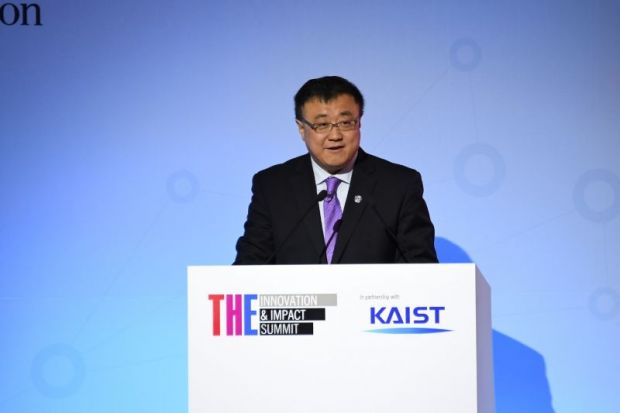The provost of China’s leading university has said that it is shifting towards cultivating students who feel comfortable challenging authority in the classroom, warning that focusing only on academic attainment risked turning campuses into “degree factories”.
Bin Yang, vice-president of Tsinghua University, told Times Higher Education’s Asia Universities Summit that the institution was “crossing over from cultivating ‘A’ students” – judged on their exam grades – “to ‘X’ students” – a model focused on a “spirit of disruptive innovation”.
And he highlighted reforms to the gao kao – the national system of university entrance exams that allocates students to different tiers of institution based entirely on their test scores – that aim to give universities more autonomy in their selection of students.
China’s economy was moving from an era of “high-speed growth” to one of “high-quality growth” reliant on innovation, Professor Yang said.
In China, “schools always pick the A students who have the highest scores in written exams”, he explained. “From kindergarten to the universities, students are always taking tests that have standard answers and [are] then ranked by their scores.”
But this model “encourages uniformity and discourages diversity and the possibility to be different and bold”, he warned.
“In the X model, the highest scores don’t necessarily make you the best leaders, learners, creators or ideal candidates for anything,” Professor Yang said. “We [at Tsinghua] appreciate, intrinsically, learning motivations more than…test grades.”
He continued: “There are lots of criticisms about the gao kao system. If central government gives us the freedom, the liberty to choose [students], do we know what kinds of…knowledge, skills and attributes matter and how to judge them?”
Another aim of the X model, Professor Yang said, was to “encourage the students to value [the] authority of idea, instead of [the] idea of authority, which is relatively difficult in Asian culture. In other words, students shouldn’t be afraid of challenging the current authority…The A model represents standardised learning as if the university teachers and faculty understand exactly what the future will bring to us.”
He added: “The A model facilitates the degree factory – the mass-produced, one-size-fits-all approach to higher education. The X model stands against standardised…notions of education and evaluation. Tsinghua is crossing over…from cultivating A students. What China and the world really need are X students.”
Professor Yang also said: “I believe that the X model approach will help Chinese universities and Asian universities to continue their rise and become global education leaders, not followers in the 21st century.”
Replying to questions from the audience, he noted that 10 Chinese provinces were reforming their university entrance exam procedures.
In Shanghai and Zhejiang provinces, students were judged “60 per cent by gao kao scores and 40 per cent by university criteria”, Professor Yang said. “So universities, they can select students by their stories and outcomes in other areas rather than just written exams. But it’s just in a very early stage.”
He warned: “One scandal can ruin all the reform battles…Then the central government, the president, would stop all the reforms. That’s my concern. So it’s very, very sensitive.”
POSTSCRIPT:
Print headline: More ‘disruptive’ students are needed in China
Register to continue
Why register?
- Registration is free and only takes a moment
- Once registered, you can read 3 articles a month
- Sign up for our newsletter
Subscribe
Or subscribe for unlimited access to:
- Unlimited access to news, views, insights & reviews
- Digital editions
- Digital access to THE’s university and college rankings analysis
Already registered or a current subscriber? Login









